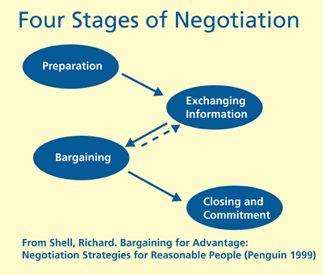Negotiation Skills
Introduction
Management function techniques will never be complete without the manager and even various other employees being able to negotiate effectively.
Any organization runs well based on the skills of their employees. From communication skills to negotiation skills, every organization would need to hone these skills in their workers to ensure the efficient running of a business organization.
You need to understand that these negotiation skills are not very difficult to grasp and will only take time and some careful moves with the other party for you to be able to close a good deal, thereby increasing employee productivity to a great extent.
Stages of Negotiation
The most precise definition of a 'negotiation' was given by Richard Shell in his book 'Bargaining for Advantage' as an interactive communication process that may takes place whenever we want something from someone else or another person wants something from us.
Richard Shell then further went on to describe the process of negotiation in four stages:

1. Preparation
When it comes to preparation, you would basically need to have a clear idea of how you are to go about with your points. One of the keys to effective negotiation is to be able to express your needs and your thoughts clearly to the other party.
It is important that you carry out some research on your own about the other party before you begin the negotiation process.
This way you will be able to find out the reputation of the other party and any famous tactics used by him/her to try and get people to agree.
You will then be well prepared to face the negotiator with confidence. Reading up on how to negotiate effectively will aid you to a great extent.
2. Exchanging Information
The information you provide must always be well researched and must be communicated effectively. Do not be afraid to ask questions in plenty.
That is the best way to understand the negotiator and look at the deal from his/her point of view. If you have any doubts, always clarify them.
3. Bargaining
The bargaining stage could be said to be the most important of the four stages. This is where most of the work is done by both parties. This is where the actual deal will begin to take shape. Terms and conditions are laid down.
Bargaining is never easy. Both parties would have to learn to compromise on several aspects to come to a final agreement.
This would mean that each party would therefore have to give up something to gain another. It is essential for you to always have an open mind and be tactful while at the same time not giving away too much and settling for less.
4. Closing and Commitment
The final stage would be where the last few adjustments to the deal are made by the parties involved, before closing the deal and placing their trust in each other for each to fulfill their role.
These four stages have proven to provide great results if studied carefully and applied. Many organizations use this strategy to help their employees negotiate successfully.
In the long run, you'll find that you will have mastered the art of negotiation and will be able to close a good deal without too much effort.
Negotiating Effectively
For the task of negotiation to be effective, you would have to ensure at all times that you are not being too aggressive.
Sometimes it is easy to get carried away during the process and take an aggressive approach to asserting your needs. This will not work. It is vital that you are positive about the negotiation process.
You need to keep in mind that the other party too has needs, listen to the negotiators views and opinions, and consider the deal from his/her angle.
You must always ensure that you gain the negotiators trust and that he/she would know that you are reliable.
You would also have to work on your communication skills if you are to be a good negotiator. Although the words coming out of your mouth may mean one thing, your body language could be quite hostile.
This will not bode well if a negotiation process is to be successful. You would need to always check on your body language to ensure that you are not sending out negative vibes, which may put off the negotiator completely.
It is essential to always be pleasant and calm no matter how stressful the process might be. Both these skills therefore will go hand in hand to quite an extent.
Conclusion
It is apt to end with a line from Freund in 'Anatomy of a Merger' 1975: In the last analysis, you cannot learn negotiating techniques from a book. You must actually negotiate.
That in itself sums up the fact that negotiation takes practice. Learning the techniques and applying them will then make you a pro at negotiating.

0 Comments:
Post a Comment
Subscribe to Post Comments [Atom]
<< Home